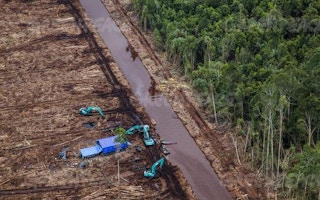Environmental group Greenpeace International has renewed its campaign against Singapore-based pulp and paper giant Asia Pacific Resources International Ltd, also known as APRIL, with fresh allegations that the company is still engaging in deforestation even as it misleads its customers about its sustainability policies.
To continue reading, subscribe to Eco‑Business.
There's something for everyone. We offer a range of subscription plans.
- Access our stories and receive our Insights Weekly newsletter with the free EB Member plan.
- Unlock unlimited access to our content and archive with EB Circle.
- Publish your content with EB Premium.
In a statement sent to media on Tuesday, Greenpeace provided a leaked customer presentation document by APRIL that stated it has “strong support” from non-profit WWF (World Wide Fund for Nature) and that the Norwegian Government has endorsed its Sustainable Forest Management Policy launched earlier this year.
Both WWF and the Norwegian Ambassador to Indonesia have confirmed that these statements are incorrect and that they do not endorse the policy, said Greenpeace.
According to its website, WWF had earlier in January “cautiously welcomed” APRIL’s policy, which outlined a commitment to support forest conservation areas equal in size to its plantations and a moratorium on plantation development in forests considered to have a high conservation value (HCV).
Despite this, Greenpeace said APRIL was still clearing dense forest and released photographic evidence collected from a flyover in late May documenting this and the drainage of peatlands at the site of an APRIL supplier on Padang Island off the coast of Riau.
But in a letter to NGOs last month, APRIL said its forest policy applies to all its concessions, including this area in question. The company said an assessment concluded the area lacks high conservation value.
“Photos circulated by Greenpeace are all taken of operational areas. These are non-HCVF areas. There is no activity in HCVF areas. HCVF areas are all being conserved. We have voluntarily set aside an additional 1,500 hectares of operating area (non-HCVF area) for further assessment by technical experts from the HCV Resource Network,” APRIL told environmental website Mongabay.
Greenpeace, however, rejected APRIL’s claims. The non-profit told Eco-Business it confirmed with the HCV Resource Network that it has peer reviewed assessments for just two out of 50 concessions that are estimated to supply APRIL, and neither of the two included the ones it has documented.
The HCV Resource Network has requested that APRIL correct its misleading claim, Greenpeace added.
“
APRIL doesn’t consider the clearance of rainforest on areas of deep peat to be in conflict with its conservation commitments. But Indonesia’s forests are disappearing faster than anywhere else in the world precisely because of practices such as these
Greenpeace Southeast Asia forest campaigner, Zulfahmi
Its latest statement comes just as ‘burning season’ kicks off in Indonesia when farmers illegally set fire to plantations as a quick and easy way to clear land for growing crops.
Greenpeace noted that the clearing and draining of peatlands are key reasons for the fires. “It’s like dousing your house in petrol and blaming a passing smoker when it all goes up in flames. Until all forests and peatland are fully protected, the fires will continue to take hold,” said forest campaigner at Greenpeace Southeast Asia, Zulfahmi.
Many of the other fires detected in Riau late last month were within concession areas of pulp and palm oil companies or their suppliers. The World Resources Institute said that using satellite data, it found that from June 17 to June 23, 75 hot spots were found within concession areas of five suppliers to paper giant Asia Pulp and Paper (APP), and 43 hot spots were within areas of one supplier to APRIL.
Last year, illegal fires led to the worst haze crisis in the region in recent years, with large swathes of Indonesia, Malaysia and Singapore covered in smog.
The Singapore Government has since proposed new legislation to fight transboundary haze. In a Parliament session on Monday, the Ministry for Environment and Water Resources revealed that it has increased the penalty for errant firms up to $2 million in the draft Bill after taking in public feedback that the original fine of up to $300,000 was too low.
If passed, the new law will also be widened to apply not only to companies that cause haze in Singapore by having fires on their land, but also those engaged by the firms to start fires.
Some other changes to the Bill included the requirement for firms to prove that fires on their land are beyond their control and knowledge, and enabling the authorities to prevent individuals from leaving Singapore if they have been served notice.
In its latest statement, Greenpeace noted that international companies such as office supplies giant Staples and global distributor of paper and packaging products Antalis recently suspended business with APRIL. It urged other firms such as the world’s largest paper company International Paper, 3M and US retailer Costco to “urgently follow their lead”.
“APRIL, a member of the Royal Golden Eagle (RGE) group, has been caught telling its customers it has support from governments and NGOs at the exact same time its bulldozers are out trashing Indonesia’s rainforests and peatlands. Will these customers continue to fall for RGE/APRIL’s PR spin or follow Staples’ lead and suspend contracts with the company?” said Zulfahmi.
“Apparently RGE/APRIL doesn’t consider the clearance of rainforest on areas of deep peat to be in conflict with its conservation commitments. But Indonesia’s forests are disappearing faster than anywhere else in the world precisely because of practices such as these,” added Zulfahmi.
APRIL did not reply to requests for a response by press time. It is one of a number of pulp companies related to the Sukanto Tanoto controlled RGE group. The others are Asia Symbol, Sateri, Bahia Speciality Cellulose and Toba Pulp Lestari.










